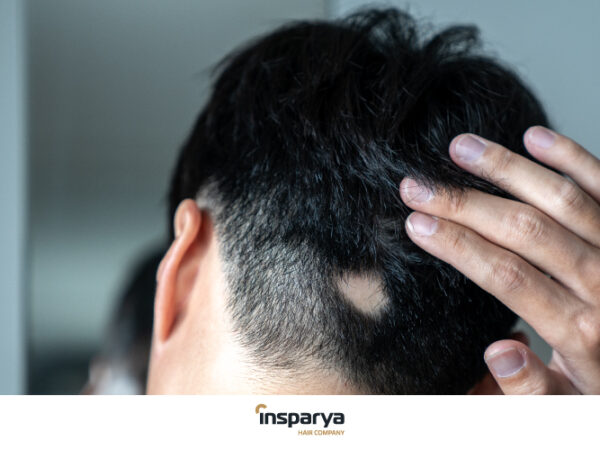
What is telogen effluvium? Causes and solutions
You have probably heard of telogen effluvium or shedding, one of the most frequent causes of hair loss, second only to androgenic alopecia. However, there is no need to be alarmed if you suspect that you may suffer from it: although the hair loss can be pronounced, if the appropriate solutions are applied, it can be reversed.
What is telogen effluvium?
Telogen effluvium is a hair growth disorder that usually manifests as diffuse hair loss. It normally affects women, who lose hair in the upper region of the head (frontoparietal area), although it can also affect lateral and posterior areas.
There are two types of telogen effluvium: acute and chronic. The former is a form of temporary hair loss, which is reversible. It often occurs in young women, although men can also suffer from it. On the other hand, chronic effluvium is the continuous loss of hair for at least six months. It is also more frequent in young women, although it can occur at more mature ages.
How does telogen effluvium manifest? The patient usually notices a loss of density in the hair, which begins to lighten in the aforementioned areas.

Causes of Telogen Effluvium
Telogen effluvium hair loss occurs when the root of the hair follicle weakens and ends up breaking the hair growth cycle.
There may be a combination of causes, or only one. Hormonal changes linked to estrogen levels are the main cause of telogen effluvium in women, as well as thyroid problems and nutritional deficiencies (such as a lack of vitamin B12, folic acid, vitamin D, or iron or zinc). Other possible triggers include very restrictive diets and low protein consumption.
Stress can also be a cause of telogen effluvium in many cases.
Telogen effluvium during pregnancy and postpartum is common. Pregnancy increases the chances of suffering from it, although it usually subsides after a few months. The reason is that after childbirth estrogen levels decrease, so the hair loses vitality and begins to fall out. Added to this is the stress of childbirth itself, which can also result in hair loss that normally lasts for 3-4 months. If it persists, it is advisable to see a specialist.
Telogen effluvium in men, although much less common, shares some of the causes as in women, such as stress and lack of iron.
A correct diagnosis is necessary in order to find the most appropriate solution. Therefore, the specialist must determine if the case is that of stress alopecia caused by stress, which increases the level of cortisol in the blood and affects the hair
It is possible for telogen effluvium to be confused, in the case of men, with androgenic alopecia, as it is much more common in the male population. However, the pattern of hair loss and the causes behind it are different.
Androgenic alopecia usually evolves more slowly, due to the miniaturisation of the hair caused by androgens, which gradually weaken the hair follicles. However, in telogen effluvium, there is a jump from the hair growth phase to the falling out phase, so hair loss occurs more suddenly. Another difference between androgenic alopecia and telogen effluvium is the areas that are affected. In the case of androgenic alopecia, hair loss is concentrated in the frontoparietal region and the vertex of the scalp, while telogen effluvium also affects the temporal and occipital regions
Telogen effluvium can also occur in the period from two weeks after transplant to two months and is a normal part of the process. In treatments such as topical Minoxidil and mesotherapy, an initial period of telogen effluvium may also occur before the positive effect of the treatment begins to be noticed.

How long does telogen effluvium last?
The duration of telogen effluvium hair loss depends on whether it is acute (occurs over a short period) or chronic telogen effluvium (continues for up to six months).
In other words, acute telogen effluvium involves diffuse, reversible and sudden hair loss, in comparison to androgenic alopecia. The hair loss can be complete in just 12-14 weeks. It is a follicle response to various types of stress, and its intensity will depend on the severity and duration of the cause. It is the most common hair loss after androgenic alopecia. It usually resolves completely within 3-6 months.
In cases of chronic telogen effluvium, hair loss can occur, with small changes, over years and even decades.
How long does it take for hair to grow after a telogen effluvium?
The good news is that telogen effluvium usually has a positive prognosis, and the hair grows back after a year at most if the patient follows the appropriate treatments. When recovery begins, short hairs will gradually begin to grow.
Telogen Effluvium Treatment and Recovery
Thanks to advances in research in the fight against alopecia, multiple options have been developed to try to maintain and strengthen hair, which are especially useful for dealing with telogen effluvium.
The first step is to address any underlying problems that may be causing it, such as stress, nutritional deficits or hormonal imbalances. Once these issues have been resolved, it may not be necessary to pursue further treatment, as hair growth may resume naturally once the cause of the hair loss has been eliminated
Likewise, it is advisable to eat a balanced diet to avoid nutritional deficiencies, try to reduce stress and get regular physical exercise. Taking these measures will help to restore the hair growth cycle sooner.
In addition to maintaining healthy habits, there are various hair and pharmacological treatments that may be helpful, such as the following:
- Hair mesotheraphy. At Insparya, we have developed our own formula that takes the technique of biostimulation and hair nutrition to the next level. The cells of the follicular units are biologically activated by subcutaneous administration of the preparation, promoting the growth of higher quality, more resilient hair. Insparya’s mesoHair mesotherapy can be applied in just 15 minutes, in a simple and painless process.
- PRP or Platelet-Rich Plasma. This treatment uses the patient’s own blood to strengthen the follicular units of the scalp. This regenerates the tissue and delays hair ageing while preventing the loss of shine and weakening of the hair. In other words, with PRP you get much younger hair.
- Low level laser. Its application on the scalp stimulates blood circulation to the follicles and increases the hair quality in the follicular unit.
- Minoxidil (topical or oral). This drug has a powerful vasodilator effect that strengthens existing hair and stimulates new growth. To get the most out of its benefits, it is very important to be consistent with the treatment and follow the doctor’s guidelines. If you stop the treatment, you will lose the benefits obtained until then and would have to start over again.
- Dutasteride. This antiandrogen medicine thickens the hair and stops it from falling out. It is administered orally or topically as a cream, lotion, or microinjection. To enhance its effects, it is advisable to also undergo hair treatments like hair mesotherapy or Platelet-Rich Plasma (PRP). A similar action is obtained from Finasteride (oral or topical), an antiandrogen drug that only inhibits type II 5-alpha-reductase enzyme, unlike Dutasteride, which blocks types I and II. This enzyme is responsible for hair loss.
- Vitamin complexes. If telogen effluvium is caused by a nutritional deficiency, the doctor may prescribe vitamin supplements to mitigate the deficiency and add them to other treatments that have been recommended.
As you can see, the causes of telogen effluvium are easy to treat, especially in acute cases. A specialist doctor should always carry out the diagnosis by doing a medical examination with a handheld dermatoscope. They should also ask a series of questions to learn about the particular state of the patient, determine the cause of the hair loss and design a solution.
If you have noticed diffuse and sudden hair loss and want to remedy it, contact Insparya now. Our multidisciplinary medical team will address the causes of hair loss so that you can recover your hair health as soon as possible.





